Explore Fukui-Shi - Japan Travel, Asia
Fukui-Shi (or Fukui) is the capital of Fukui Prefecture, located on the west coast of Japan's Honshu Island. Despite being lesser-known compared to other Japanese cities, Fukui boasts a wealth of cultural, historical, and natural attractions. It's easily accessible from major cities like Tokyo, Osaka, and Kyoto, making it an ideal destination for both short visits and extended stays. The city's proximity to the sea and mountains provides a diverse range of activities and scenic views.
Looking for an unforgettable journey through Japan? Explore our premium tours here and start planning your adventure.
Population: Approximately 264,000 in 2017.
Economy: The economy of Fukui is mixed between finance centers, manufacturing, agriculture, and commercial fishing, all of which are contributors to the local economy.
Landmarks: Famous for the Eiheiji Temple, Fukui Castle Ruins, and Tojinbo Cliffs.
Japan

Overview of Fukui-Shi
History & Cultural Influence
Fukui-Shi's history dates back to the Asuka period (538-710 AD), and it has played a significant role throughout Japan's historical timeline. The city was a prominent castle town during the Edo period (1603-1868), serving as the seat of the powerful Matsudaira clan. Fukui Castle, although now in ruins, remains a testament to the city's historical significance. Fukui's traditional Japanese art, architecture, and festivals make up its cultural legacy. The influence of Zen Buddhism is particularly notable, with Eiheiji Temple serving as a spiritual hub. This cultural heritage is preserved and celebrated through local festivals, traditional crafts, and daily life in Fukui.
Interaction with The Locals
Fukui has a population of approximately 264,000 residents. The citizens of Fukui are known for their warm hospitality and pride in their local culture and traditions. They are welcoming to visitors with a strong emphasis on preserving cultural heritage while embracing modernity. This blend of tradition and contemporary living makes Fukui a unique and inviting destination for travelers seeking a less-crowded destination in Japan.
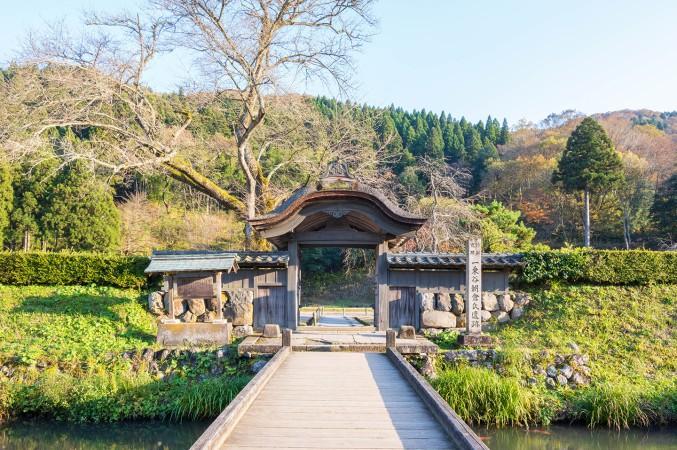
Fukui's ancient architecture - © Japan Tourism
Top Attractions in Fukui-Shi
Eiheiji Temple
Eiheiji Temple, founded in 1244 by the Zen master Dogen, is one of the two head temples of the Soto school of Zen Buddhism. Nestled in the mountains, this tranquil temple complex offers visitors a serene environment to practice Zen meditation or simply enjoy the peaceful surroundings. The beautiful wooden structures, moss-covered stone paths, and centuries-old trees create an atmosphere of deep spiritual significance, making it the must-visit site in Fukui.
Fukui Castle Ruins
The Fukui Castle Ruins are a testament to the city's rich feudal history. Once a grand castle belonging to the Matsudaira clan, it now features remnants of its former glory, including stone walls and a moat. Visitors can walk around the site, imagining the grandeur of the Edo period while enjoying the well-maintained gardens and the beautiful cherry blossoms in spring.
Tojinbo Cliffs
The Tojinbo Cliffs are a natural wonder that offers breathtaking views of the rugged coastline along the Sea of Japan. These dramatic basalt cliffs, formed by volcanic activity millions of years ago, are a popular spot for photography and nature walks. The crashing waves against the cliffs create a mesmerizing spectacle, especially during sunset. Boat tours are also available for those who want to experience the cliffs from the sea.
Fukui Prefectural Dinosaur Museum
The Fukui Prefectural Dinosaur Museum is one of the world's leading dinosaur museums and a must-visit for families and dinosaur enthusiasts. Located in Katsuyama, a short drive from Fukui City, the museum houses extensive exhibits featuring life-sized dinosaur skeletons, fossil displays, and interactive exhibits. It's a fascinating journey through prehistoric times, offering educational and entertaining experiences for all ages.
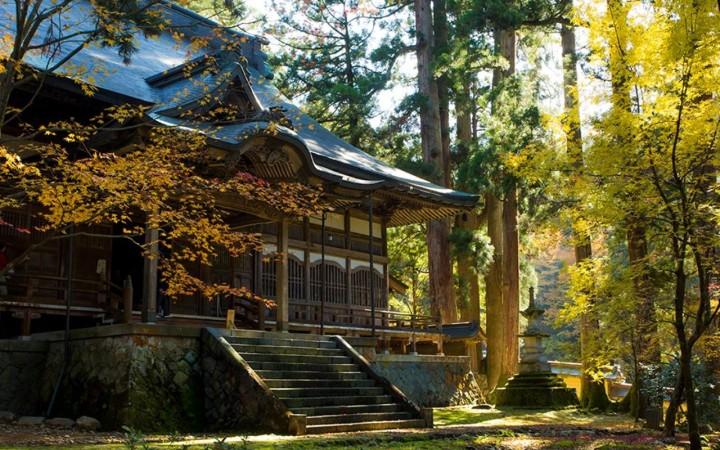
Eiheiji Temple - © Zen Buddhism
Must-Try Dishes in Fukui-Shi
- Echizen Oroshi Soba: This beloved dish features chilled buckwheat noodles topped with grated daikon radish, served with a flavorful dipping sauce. The refreshing taste makes it a perfect choice for a light, satisfying meal.
- Wakasa Obama Seafood: The seafood from Wakasa Obama is renowned for its freshness and quality. Enjoy a variety of dishes, from delicate sashimi to savory grilled fish, highlighting Fukui’s rich maritime resources.
- Fukui Sake: Known for its exceptional quality, Fukui’s sake is made using pure local water and premium rice. Explore different sake varieties at local breweries and savor the unique flavors of this traditional beverage.
- Fukui Sushi: Fukui is also known for its specialty sushi, featuring fresh, locally-sourced fish. The sushi here is often served with innovative toppings and flavorful sauces, reflecting the region’s culinary creativity.
- Kurobuta Pork: This local delicacy, made from premium black pork, is renowned for its rich flavor and tenderness. Kurobuta pork is typically served in various forms, such as grilled or in stews, and is a must-try for meat lovers.
- Heshiko: A traditional preserved fish dish, Heshiko is made by fermenting mackerel with rice bran. The resulting flavor is unique and tangy, making it an interesting addition to any meal.
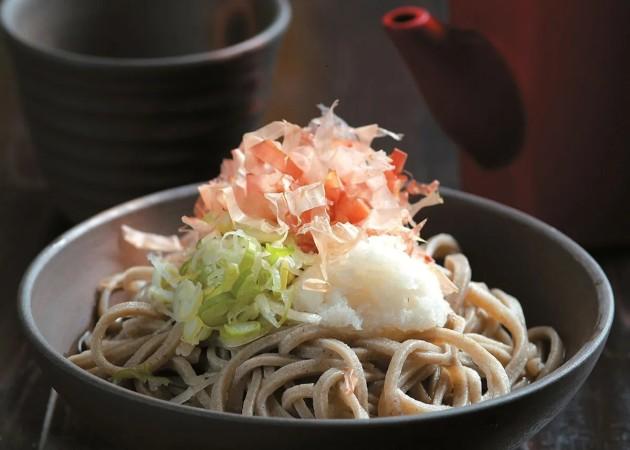
Echizen Oroshi Soba - © Eats.jp
Festivals & Local Celebrations
Fukui Phoenix Festival
The Fukui Phoenix Festival, held every August, is one of the city's most vibrant and celebrated events. This summer festival features a dynamic array of activities, including lively parades with colorful floats, traditional taiko drum performances, and energetic dance routines. The festival's highlight is the spectacular fireworks display, which lights up the night sky and draws crowds from all around.
Echizen Paper Festival
Celebrated in October, the Echizen Paper Festival is a unique event that honors Fukui’s long-standing tradition of papermaking. The festival showcases the art of Echizen paper, known for its high quality and historical significance. Watching live demonstrations of traditional paper-making techniques or participating in hands-on workshops and browsing exhibitions of paper art are some of the must-try activities in the festival.
Fukui Cherry Blossom Festival
In spring, the Fukui Cherry Blossom Festival transforms the city into a picturesque landscape of blooming cherry blossoms. Held in various parks and along riversides, this festival offers beautiful views of sakura trees in full bloom. Visitors can enjoy hanami (flower viewing) parties under the cherry trees, taste seasonal delicacies from food stalls, and participate in various outdoor activities.
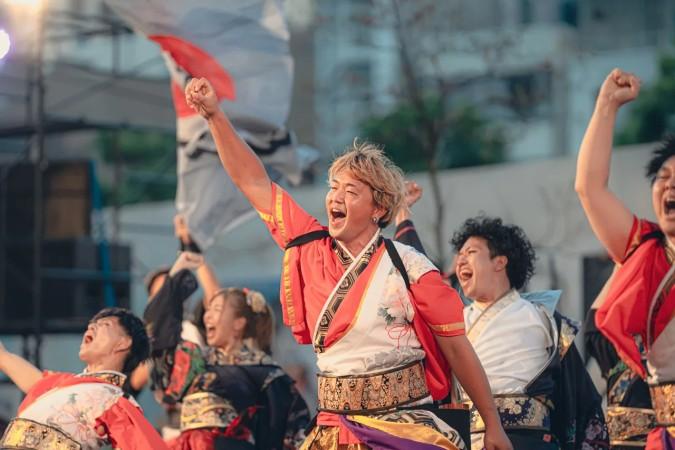
Fukui Phoenix Festival - © Eiichi Yoshioka Photography
What to Do in Fukui-Shi
Outdoor Activities in Fukui
- Hiking Trails in Fukui: Fukui’s natural landscapes offer excellent opportunities for outdoor enthusiasts. The region features numerous hiking trails that wind through scenic forests, mountains, and along the coast. Popular trails include those in the Tsuruga City area and the scenic routes around the Tojinbo Cliffs.
- Beach and Coastal Exploration: Fukui’s coastline provides beautiful spots for beachgoers and those interested in coastal activities. The clear waters and picturesque beaches are perfect for swimming, picnicking, or simply relaxing while enjoying the sea breeze.
Cultural Experiences in Fukui
- Traditional Crafts Workshops: Fukui offers engaging cultural experiences through workshops on traditional Japanese crafts. Visitors can participate in activities such as pottery making, indigo dyeing, and traditional paper crafts, gaining hands-on experience and insight into local artistic traditions.
- Japanese Tea Ceremonies: Experience the tranquility of a traditional Japanese tea ceremony in Fukui. This time-honored practice, known for its elegance and mindfulness, allows visitors to appreciate the art of tea preparation and the cultural significance of this ritual.
Curious about Hiroshima? Learn more about what makes this spot so special in our detailed article.
Shopping in Fukui-Shi
- Echizen Pottery Shops: Explore the traditional Echizen ware pottery at various shops around Fukui. Renowned for its craftsmanship and unique designs, Echizen pottery makes for memorable souvenirs and gifts.
- Fukui Paper Crafts Stores: Visit stores specializing in Echizen paper products, including beautifully crafted stationery, decorations, and art pieces. These shops offer a variety of paper-based goods that showcase the region’s rich papermaking heritage.
- Katsuyama Shopping District: This district features a mix of retail outlets, local stores, and eateries. It’s a popular area for shopping and dining, offering a taste of both modern and traditional Fukui.
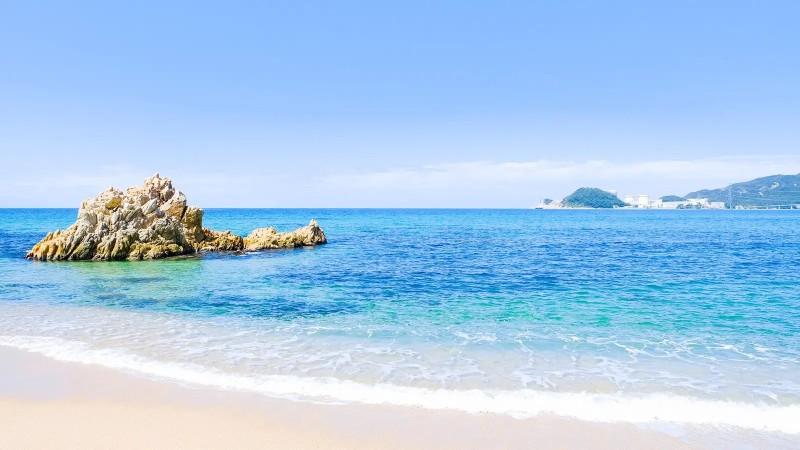
Seeking haven at Fukui pristine beach - © Japan Tourism
Weather in Fukui-Shi: Best Time to Visit
Spring in Fukui-Shi
- Weather: Spring in Fukui features mild temperatures ranging from 10°C to 20°C (50°F to 68°F), with occasional rain showers. With the cherry blossoms in full bloom, the view is lovely.
- Tourism Trend: Spring is a popular time for tourism in Fukui due to the cherry blossom season. Visitors flock to parks and riversides for hanami (flower viewing) parties, making it an ideal period for outdoor activities and scenic photography. The pleasant weather also encourages hiking and exploring the city's cultural sites.
Summer in Fukui-Shi
- Weather: Summer temperatures in Fukui can reach 25°C to 35°C (77°F to 95°F), with high humidity and increased rainfall, especially during the rainy season in June and July.
- Tourism Trend: Despite the heat, summer is a vibrant time in Fukui with numerous festivals and outdoor events, such as the Fukui Phoenix Festival. Tourists enjoy the lively atmosphere, fireworks displays, and traditional performances. Coastal activities and visits to local markets are also popular during this season.
Autumn in Fukui-Shi
- Weather: Autumn temperatures range from 10°C to 20°C (50°F to 68°F), with crisp air and dry conditions. The scenery is enhanced with vivid hues by the fall leaves.
- Tourism Trend: Autumn is a favored season for tourism in Fukui due to the beautiful fall colors and comfortable weather. Visitors take advantage of the ideal hiking conditions and scenic drives to enjoy the autumn foliage. Seasonal events and cultural festivals, such as the Echizen Paper Festival, also attract tourists.
Winter in Fukui-Shi
- Weather: Winter temperatures range from -5°C to 10°C (23°F to 50°F), with cold weather and frequent snowfall, particularly in January and February.
- Tourism Trend: Winter tourism in Fukui focuses on enjoying the snow-covered landscapes and participating in seasonal events. The city's winter illuminations and festivals offer a festive atmosphere and beautiful backdrop for photographing while indoor attractions and hot springs are also popular among visitors seeking warmth and relaxation.
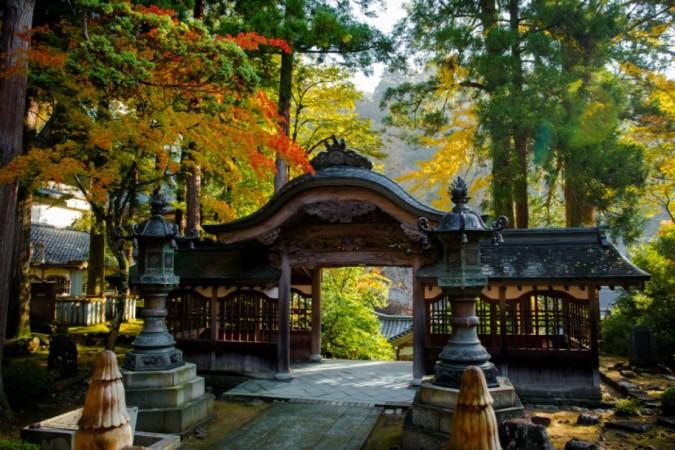
Eiheiji Temple during autumn - © ZEKKEI Japan
Culture Etiquette in Fukui-Shi
Sento Customs
Fukui's traditional bathhouses, or sento, follow specific customs:
- Pre-Bath Rinsing: Before entering a communal bath, it is customary to thoroughly wash and rinse your body at the designated stations. This practice ensures that the bathwater remains clean for everyone.
- Quiet Reflection: Baths in Fukui are meant for relaxation and reflection. It is important to keep noise to a minimum and respect the peaceful environment of the bathhouse.
Local Festivals Participation
During local festivals and events, such as the Fukui Phoenix Festival, it’s important to:
- Respect Traditions: Participate respectfully and observe local customs. For example, during parades or ceremonies, follow the lead of locals and avoid disruptive behavior.
- Dress Appropriately: Wear comfortable, appropriate attire, especially if you plan to join in traditional activities or wear a yukata (summer kimono) if offered by the festival.
Want to know about Osaka? Check out our insights here and see why it's worth a visit.
Essential Travel Information
Getting Around Fukui
- Trains and Subways: Fukui City is well-connected by train, with the Fukui Station serving as a major hub. The JR West and Echizen Railway lines provide convenient access to various parts of the city and neighboring regions.
- Buses: Local buses in Fukui offer routes throughout the city and to nearby attractions. The bus system is user-friendly, with clear schedules and route maps available.
- Taxis: Taxis are readily available in Fukui and can be hailed on the street or booked in advance. They are a convenient option for short trips or when traveling with luggage.
- Car Rentals: For more flexibility in exploring Fukui and its surroundings, renting a car is a viable option. Having a car allows for easy access to remote attractions and scenic drives.
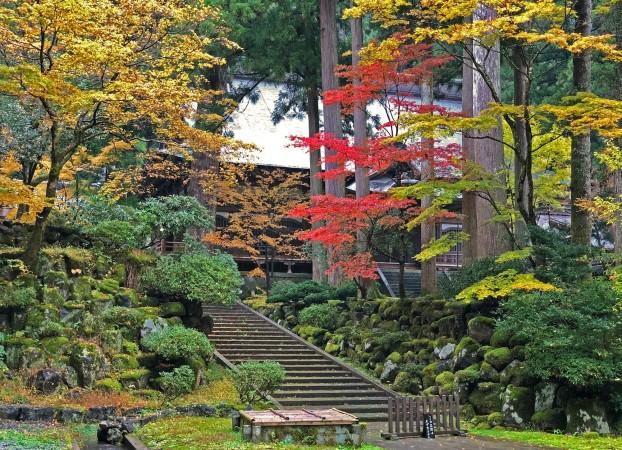
Capture the beautiful scenes of Fukui - © Tomas Gonzalez de Rosenzweig
ATM & Banking Services
ATMs are readily available throughout Fukui, including at major banks, convenience stores, and shopping centers, with many offering international withdrawal options for foreign credit or debit cards. Since not all businesses take credit or debit cards, some cash in your pocket would come in handy. Fukui also features a range of banking institutions providing standard services such as currency exchange and account management. Many of these banks offer assistance in English, ensuring a smooth banking experience for international visitors.
Where to Stay in Fukui
Fukui offers a diverse range of accommodation options to suit various preferences and budgets. Luxury hotels provide top-notch amenities, fine dining, and wellness facilities for those seeking a premium experience. For a more budget-friendly choice, mid-range hotels offer comfortable rooms and essential amenities, balancing cost and quality. For a traditional Japanese experience, staying in a ryokan provides tatami-matted rooms, futon bedding, and multi-course meals, offering an authentic cultural immersion. Additionally, local guesthouses and inns offer a personal and cost-effective lodging experience, with a cozy atmosphere and opportunities to interact with local hosts.
Articles for you

Experience Aboard The RV Indochine II - A Mekong Cruise With Tweet World Travel
The RV Indochine II is a luxury river cruise ship, offering an unforgettable journey through many attractions along the Mekong River. Built in 2017, this upscale vessel combines colonial elegance with modern conveniences to create a comfortable yet stylish environment for its crew and passengers. The ship’s intimate size makes it ideal for those seeking a more personal cruising experience while exploring Vietnam and Cambodia rich culture, scenery, and heritage. Whether you're gazing at the landscape from your private balcony or enjoying authentic local cuisine, RV Indochine II promises an exotic adventure like no other.

Witness Stilt Fishing In Sri Lanka: An Eco-Tourism Experience
Sri Lanka, renowned for its stunning beaches and rich cultural heritage, harbors a unique tradition that has captivated travelers for centuries: stilt fishing. This ancient practice, passed down through generations of coastal communities, blends artistry with necessity, offering a glimpse into a way of life intimately connected to the island's coastal rhythms. Stilt fishing in Sri Lanka isn't merely a means to catch fish; it's a cultural emblem, embodying the resilience and ingenuity of Sri Lanka's fishing communities.

Make Your Trip Stress-Free With The Tweet Trip App
Embark on your next adventure with confidence by downloading the Tweet Trip App, available for both iOS and Android. This essential travel companion allows you to view your detailed itinerary, stay connected with your tour guide and fellow travelers, receive real-time updates, and provide feedback effortlessly. With features like in-app messaging, emergency assistance, and location sharing, the Tweet Trip App ensures you travel smarter, stay connected, and enjoy a seamless, worry-free journey. Get started today and make the most of your travel experience with Tweet World Travel.

Pedal Through Paradise: Unveiling Cambodia's Hidden Gems on Two Wheels
The gentle whir of bicycle wheels mingles with the distant chants of monks as you glide past emerald rice paddies stretching to the horizon. This is Cambodia - a sensory explosion waiting to be experienced on two wheels. At Tweet Tours, we believe there's no better way to immerse yourself in the Kingdom of Wonder than by bicycle.
Cambodia isn't just a destination; it's a living, breathing tapestry of ancient wonders, natural beauty, and vibrant culture. Our carefully crafted cycling tours take you beyond the typical tourist haunts, offering a unique perspective on this captivating country. Ready to clip in and discover the magic of Cambodia? Let's ride!

Trekking in the Himalayas: A Journey Through Nepal's Majestic Peaks
The Himalayas rise from the earth like colossal guardians, their snow-capped peaks piercing the sky in a display of nature's raw power and beauty. Nepal, nestled at the heart of this mountain range, serves as the gateway to some of the most breathtaking trekking experiences on the planet. Here, the air is crisp and thin, filled with the promise of adventure and the whispers of ancient tales.
With Tweet Tours, as you set foot on these hallowed trails, you're not just a traveler - you're a modern-day explorer, following in the footsteps of legendary mountaineers and age-old traders. Each step takes you further into a world where nature reigns supreme and human resilience is tested against the backdrop of some of the world's highest peaks.
From the moment your boots touch the ground in Kathmandu, you'll feel the pull of the mountains. The bustling streets of the capital, with their sensory overload of sights, sounds, and smells, soon give way to serene mountain paths where the only soundtrack is the crunch of gravel underfoot and the distant tinkling of yak bells.

Exploring Mui Ne's Wonders: Unique Attractions & Local Dishes
Nestled along the southeastern coast of Vietnam, Mui Ne emerges as a captivating gem, blending natural wonders with cultural richness. Renowned for its stunning landscapes and unique attractions, Mui Ne beckons travelers seeking both relaxation and adventure in equal measure. Mui Ne's renowned beach dunes, bustling fishing towns, and excellent local food await exploration at every turn.
The allure of Mui Ne lies not only in its pristine beaches and crystal-clear waters but also in its diverse range of activities catering to every traveler's whims. Whether you're drawn to thrilling water sports like kitesurfing and windsurfing on its dynamic shores or seeking tranquility amidst the picturesque Fairy Stream, Mui Ne promises an unforgettable journey filled with discovery.
